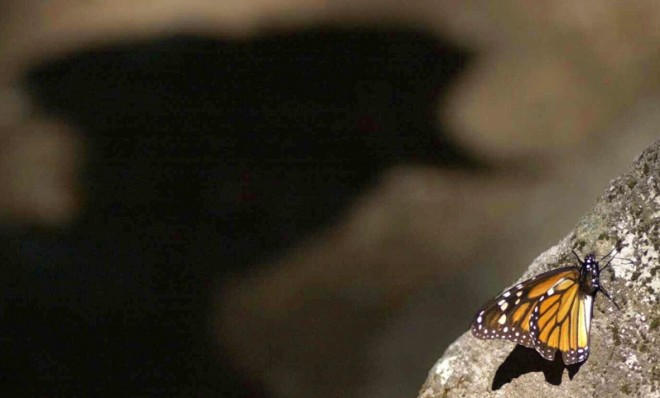Why monarch butterflies are dying in record numbers
The magisterial insects have been hit hard by extreme weather and new farming practices


A free daily email with the biggest news stories of the day – and the best features from TheWeek.com
You are now subscribed
Your newsletter sign-up was successful
This week, scientists reported that the monarch butterfly population in Mexico this winter fell to its lowest level in two decades, an alarming trend that could spell disaster for the familiar orange-and-black insects, which every year make a round-trip migration from Mexico to Canada.
The forest area occupied by the butterflies during their winter sojourn in Mexico had fallen to 2.94 acres in December, down 59 percent from last year and from a high of 50 acres. The study was conducted by Mexico's National Commission of Natural Protected Areas, in conjunction with the World Wildlife Fund and telecommunications company Telcel.
While butterfly populations can fluctuate wildly from year to year, the latest numbers are being seen as evidence of a long-term decline in the monarch population. Experts say the trend "can no longer be seen as a combination of yearly or seasonal events," says The Associated Press.
The Week
Escape your echo chamber. Get the facts behind the news, plus analysis from multiple perspectives.

Sign up for The Week's Free Newsletters
From our morning news briefing to a weekly Good News Newsletter, get the best of The Week delivered directly to your inbox.
From our morning news briefing to a weekly Good News Newsletter, get the best of The Week delivered directly to your inbox.
Why are the monarchs dying? One theory is extreme weather in the United States. The migration is completed relay-style by successive generations of monarchs, with newborn butterflies replacing their elders as they die off. (Indeed, how the memory of the cyclical journey is passed on from one generation to the next remains one of the greatest mysteries of the natural world.) In other words, the butterflies need to reproduce en route, and a recent spell of soaring summer temperatures in the U.S. has disrupted their reproductive cycle. "The hot weather dried insect eggs and lowered the nectar content of the milkweed on which they feed," according to The New York Times.
In addition, new farming practices in the U.S. have led to a stark drop in available milkweed. According to The Los Angeles Times:
[T]he decline is due in great part to the widespread use of the herbicide glyphosate. In key U.S. states where the butterfly feeds and breeds — Iowa, Minnesota, Wisconsin, Illinois, Indiana, parts of Ohio and the eastern Dakotas — farmers have planted more than 120 million acres of corn and soybeans genetically modified to resist the herbicide… That allows them to use glyphosate to kill milkweed, the monarchs' essential food. [Los Angeles Times]
The decline in the monarch population could have profound implications for other species. Butterflies, along with bees, play a crucial role in disseminating pollen, meaning plant diversity could diminish as butterfly populations dip. Furthermore, "fewer butterflies probably means there are fewer other insects that are food for birds, and fewer birds for larger predators," says The New York Times.
Scientists say a concerted effort by the U.S. and Canada could easily reverse the downward trend. Mexico has already taken steps to reduce logging in areas where the monarch resides, and conservationists say the U.S. could concentrate on expanding areas where milkweed is available. "It is now necessary for the United States and Canada to do their part and protect the butterflies' habitat in their territories," says Omar Vidal, the WWF director in Mexico.
A free daily email with the biggest news stories of the day – and the best features from TheWeek.com
Ryu Spaeth is deputy editor at TheWeek.com. Follow him on Twitter.
-
 Crisis in Cuba: a ‘golden opportunity’ for Washington?
Crisis in Cuba: a ‘golden opportunity’ for Washington?Talking Point The Trump administration is applying the pressure, and with Latin America swinging to the right, Havana is becoming more ‘politically isolated’
-
 5 thoroughly redacted cartoons about Pam Bondi protecting predators
5 thoroughly redacted cartoons about Pam Bondi protecting predatorsCartoons Artists take on the real victim, types of protection, and more
-
 Palestine Action and the trouble with defining terrorism
Palestine Action and the trouble with defining terrorismIn the Spotlight The issues with proscribing the group ‘became apparent as soon as the police began putting it into practice’